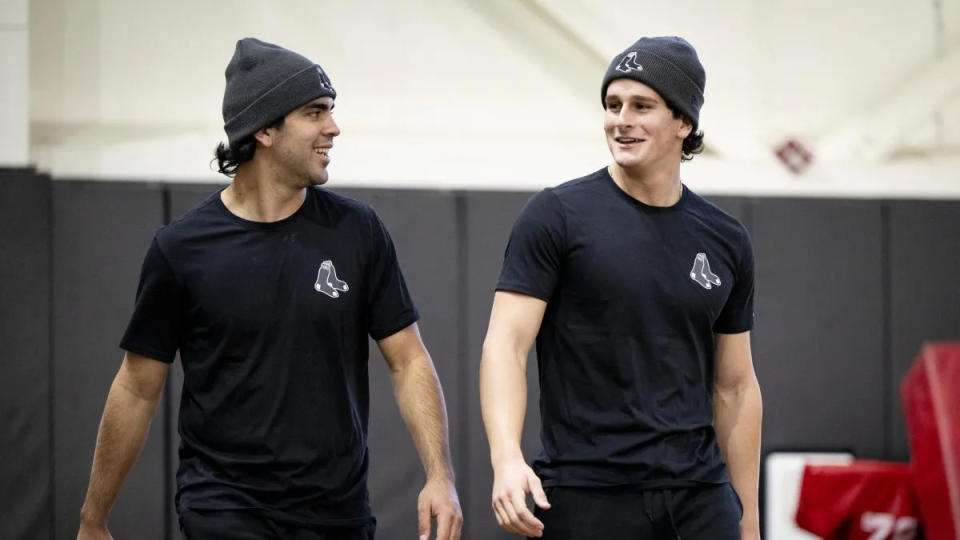The miscalculation at the heart of the Red Sox rebuild
The miscalculation at the heart of the Red Sox rebuild originally appeared on NBC Sports Boston
The Red Sox have a plan. It is not a good plan.
The problem? They're doing it backwards.
They claim they'll spend again when their best prospects reach the big leagues, continuing a frustrating game of Title Windows that sounds like something you'd play on your phone. Ever since Chaim Bloom arrived and promptly traded Mookie Betts because paying him didn't fit the team's contention window, the Red Sox have not only closed the curtains and dropped the shades, they've nailed up storm shutters, too.
They don't seem to be in any rush to open a new window, and it's such a massive, obvious mistake, I suspect we'll one day look back at the this stretch and marvel, "What did they think was gonna happen?"
The Red Sox can say whatever they want about their commitment to winning, but their actions tell the story. Their plan, such as it is, is to wait for the three best prospects of the Bloom Era to reach Fenway, maybe starting this year, and then build around them.
Three strong prospects is not a lot to show for the last four years of misery, especially when none of them are pitchers, but failing an aggressive return to free agency, the franchise's best hope is that shortstop Marcelo Mayer, outfielder Roman Anthony, and catcher Kyle Teel don't just hit, but hit big.
Their success is by no means guaranteed, seeing as none has taken a swing beyond Double-A. The most successful homegrown cores generally featured prospects considered the best in the game, whether it's the Cubs (Kris Bryant), Astros (Carlos Correa), Braves (Ronald Acuña Jr.), or Dodgers (Corey Seager). The Orioles are built around two such players (Adley Rutschman and Gunnar Henderson), with a third (Jackson Holliday) gestating at Triple-A.
There's no guarantee this Red Sox trio will be All-Stars, let alone superstars. And yet the team has pinned its entire hopes -- and justified its sleepy offseason of inaction -- by highlighting how much promise the future holds.

Maybe management is right and all three hit their ceilings to become Boston's version of Derek Jeter, Bernie Williams, and Jorge Posada. But even if that best-case scenario comes to pass, there's still a potentially fatal flaw in the plan, and it's promoting the youngsters to a big-league roster otherwise bereft of veteran talent and leadership. There will be nowhere to hide.
Just consider every young star to reach Fenway Park over the last three decades. None of them needed to play savior.
Nomar Garciaparra is probably the closest to that description, and he arrived at the end of 1996 to a clubhouse that included Roger Clemens, Mo Vaughn, John Valentin, and Mike Greenwell.
A decade later, it was Dustin Pedroia's turn. Imagine how differently his career might've unfolded if he hadn't had Mike Lowell, Manny Ramirez, David Ortiz, and future manager Alex Cora to ease his transition when he hit .182 that April.
Fast-forward again, and Xander Bogaerts, Betts, and Jackie Bradley Jr. made no secret of the fact that having Ortiz, Pedroia, and Jon Lester around eased their transitions. Even after making All-Star teams in 2016, Betts and Bogaerts described themselves as supporting players following Ortiz's lead.
In each case, the veterans in place allowed the youngsters to develop without the pressure of the franchise on their shoulders. They eventually flourished.
But the Red Sox seem intent on starting as close to zero with Mayer and Co. as possible. Other than third baseman Rafael Devers, who's not really programmed to lead, they've systematically bled high-end talent over the last five years.
That means when the prospects arrive, the pressure will be on them to perform immediately, and that's a big ask. It took Bogaerts four years to make his first All-Star team and seven to blossom into a true superstar. Jacoby Ellsbury's breakout came in his fifth season. Even the brilliant Betts didn't truly blossom until his third season.
In every case, the hopes of the franchise did not rest on their young shoulders. It's a lesson the Red Sox appear to have forgotten, and it could have disastrous consequences.

